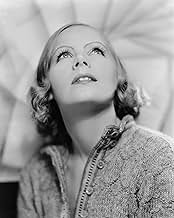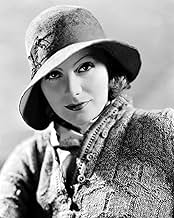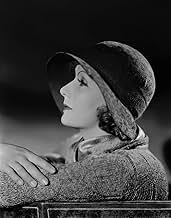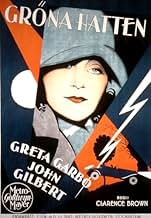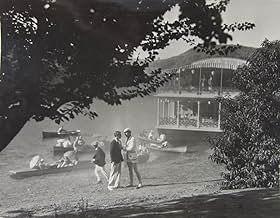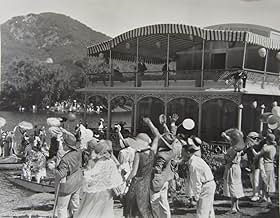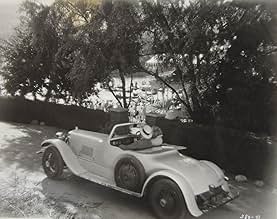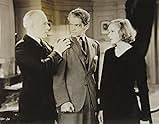NOTE IMDb
7,1/10
1,8 k
MA NOTE
Après un chagrin d'amour, Diana s'abandonne à la mauvaise vie et cherche le bonheur dans les bras d'autres hommes. Finalement, elle en épouse un qui s'avère être un criminel.Après un chagrin d'amour, Diana s'abandonne à la mauvaise vie et cherche le bonheur dans les bras d'autres hommes. Finalement, elle en épouse un qui s'avère être un criminel.Après un chagrin d'amour, Diana s'abandonne à la mauvaise vie et cherche le bonheur dans les bras d'autres hommes. Finalement, elle en épouse un qui s'avère être un criminel.
- Réalisation
- Scénario
- Casting principal
- Nommé pour 1 Oscar
- 2 victoires et 1 nomination au total
Johnny Mack Brown
- David Furness
- (as John Mack Brown)
Gertrude Astor
- Party Guest
- (non crédité)
Agostino Borgato
- French Police Inspector
- (non crédité)
F.F. Guenste
- Servant at Davids Death Investigation
- (non crédité)
Sydney Jarvis
- Gendarme
- (non crédité)
Fred Kelsey
- Detective
- (non crédité)
Anita Louise
- Diana - as a Child
- (non crédité)
Alphonse Martell
- French Hotel Concierge
- (non crédité)
William H. O'Brien
- Man Peering Into Room
- (non crédité)
Frank Finch Smiles
- Butler
- (non crédité)
Avis à la une
'A Woman of Affairs' had a good deal going for it. It starred the always magical Greta Garbo. It had John Gilbert as her leading man, they always worked beautifully together in the four films they did together (starting with 'Flesh and the Devil' and finishing with 'Queen Christina') and Gilbert. It had Clarence Brown as director, he was not a consistent director as such but he was a sympathetic one with the right material. It had Douglas Fairbanks Jr in a more dramatic role. And it had Lewis Stone, another Garbo regular.
While not a great film as such, 'A Woman of Affairs' is a must for fans of Garbo who gives one of her best silent film performances. This is also a good representation of how well she and Gilbert worked together, and one of her better films with Brown as director. It is not a film for anybody who likes their stories realistic and more subtle, but for beautiful filming, emotional impact and good acting, 'A Woman of Affairs' is definitely worth seeing.
Is it perfect? No, and the story is the weak link. Not in a dull way, but it does get very melodramatic in the latter stages of the film and some parts are not just silly but sense and credulity go out of the window at times. Just didn't buy how some events happen as fast as they do here. The ending is both rushed and contrived.
Part of me did wish too that Gilbert's role was better developed and more interesting. Gilbert does very well with it but deserved more to do.
Garbo though is absolutely enchanting, she looks radiant and her presence is movingly noble and Diana's suffering portrayed with such graceful subtlety. Gilbert does well with what he has and he and Garbo match each other beautifully, never too restrained or overwrought and always sparkling. Stone is sincerely reserved as usual, while Fairbanks gives one of his better serious performances and is quite moving. Dorothy Sebastian sparkles. Brown directs sympathetically, no indifference here, and some of it is quite imaginative, the more symbolic moments not laid on too thick.
Despite the melodrama and silliness, there are many melancholic stretches handled with a lot of sincerity and not heavy-handedness and they come over as genuinely poignant and not over-bleak. 'A Woman of Affairs' is a very well made film and quite ravishingly photographed in the best moments. Carl Davis (known for writing compositions for many silent films much later on) provides a haunting and well fitting score, even if other scores of his for other films did better at enhancing the atmosphere, action etc.
Summing up, worth seeing for Garbo especially but didn't blow me away. 7/10
While not a great film as such, 'A Woman of Affairs' is a must for fans of Garbo who gives one of her best silent film performances. This is also a good representation of how well she and Gilbert worked together, and one of her better films with Brown as director. It is not a film for anybody who likes their stories realistic and more subtle, but for beautiful filming, emotional impact and good acting, 'A Woman of Affairs' is definitely worth seeing.
Is it perfect? No, and the story is the weak link. Not in a dull way, but it does get very melodramatic in the latter stages of the film and some parts are not just silly but sense and credulity go out of the window at times. Just didn't buy how some events happen as fast as they do here. The ending is both rushed and contrived.
Part of me did wish too that Gilbert's role was better developed and more interesting. Gilbert does very well with it but deserved more to do.
Garbo though is absolutely enchanting, she looks radiant and her presence is movingly noble and Diana's suffering portrayed with such graceful subtlety. Gilbert does well with what he has and he and Garbo match each other beautifully, never too restrained or overwrought and always sparkling. Stone is sincerely reserved as usual, while Fairbanks gives one of his better serious performances and is quite moving. Dorothy Sebastian sparkles. Brown directs sympathetically, no indifference here, and some of it is quite imaginative, the more symbolic moments not laid on too thick.
Despite the melodrama and silliness, there are many melancholic stretches handled with a lot of sincerity and not heavy-handedness and they come over as genuinely poignant and not over-bleak. 'A Woman of Affairs' is a very well made film and quite ravishingly photographed in the best moments. Carl Davis (known for writing compositions for many silent films much later on) provides a haunting and well fitting score, even if other scores of his for other films did better at enhancing the atmosphere, action etc.
Summing up, worth seeing for Garbo especially but didn't blow me away. 7/10
This film is a great Garbo vehicle, and has such a perfect example of her mystique. She somehow manages to be a woman who enjoys sexual pleasure and the company of men, but at the same time, is saintly, with a love that is pure for only one man, and sacrifices herself in more than one way ... and she is transcendent on both sides of this coin. The film is packed with moments where a range of her wonderful expressions are on display, some vivid, some subtle. If you're a Garbo fan or want to become one, this would certainly not be a bad place to start.
Unfortunately, the film suffers a bit from a heavy dose of melodrama, most of which seems pretty contrived. The plot often doesn't make a lot of sense, in part because the original story was watered down pretty significantly for the censors. An example of this is the questioning of Garbo after her husband has committed suicide. It's obvious why this happened; he was about to be arrested for embezzlement and the police saw him jump, so the viewer (ok me anyway) is watching the aftermath thinking huh? In the original, however, it was because he has syphilis, something that was obviously a personal secret, and hence the questioning (and also later shunning) of Garbo. There are other examples that took too much of the edge off the story and made it less sensical.
Garbo dominates the film, but it's a fine cast behind her. John Gilbert is given less to do here which is too bad, but the chemistry the pair had is quite evident in a couple of open lip kisses. Dorothy Sebastian is radiant as a virtuous woman, and Douglas Fairbanks, Jr. is suitably desperate as an alcoholic.
The film touches on marrying someone who is decent and loving them for that quality, but being passionate and truly in love with someone else, which is a timeless theme. The scene where Garbo is waiting in her honeymoon bed and gets a tepid kiss on the forehead, then in frustration resorts to turning on and off the overhead light after being left alone says it all. At one point her real love, played, by Gilbert, asks "Why did I ever let you go?" to which she responds "Yes, why?", and I don't think the film gives a good answer to this question, especially as it plays out. The pace as it does so is a little on the slow side too, and the dramatic ending is over-the-top. It's a near miss for getting a higher rating, but it's certainly watchable for Garbo.
Unfortunately, the film suffers a bit from a heavy dose of melodrama, most of which seems pretty contrived. The plot often doesn't make a lot of sense, in part because the original story was watered down pretty significantly for the censors. An example of this is the questioning of Garbo after her husband has committed suicide. It's obvious why this happened; he was about to be arrested for embezzlement and the police saw him jump, so the viewer (ok me anyway) is watching the aftermath thinking huh? In the original, however, it was because he has syphilis, something that was obviously a personal secret, and hence the questioning (and also later shunning) of Garbo. There are other examples that took too much of the edge off the story and made it less sensical.
Garbo dominates the film, but it's a fine cast behind her. John Gilbert is given less to do here which is too bad, but the chemistry the pair had is quite evident in a couple of open lip kisses. Dorothy Sebastian is radiant as a virtuous woman, and Douglas Fairbanks, Jr. is suitably desperate as an alcoholic.
The film touches on marrying someone who is decent and loving them for that quality, but being passionate and truly in love with someone else, which is a timeless theme. The scene where Garbo is waiting in her honeymoon bed and gets a tepid kiss on the forehead, then in frustration resorts to turning on and off the overhead light after being left alone says it all. At one point her real love, played, by Gilbert, asks "Why did I ever let you go?" to which she responds "Yes, why?", and I don't think the film gives a good answer to this question, especially as it plays out. The pace as it does so is a little on the slow side too, and the dramatic ending is over-the-top. It's a near miss for getting a higher rating, but it's certainly watchable for Garbo.
Adapted from the novel "The Green Hat", I would have retitled it "Two Gallant Ladies and The Men Who Messed Everything Up". However, even that doesn't do it justice. This is almost a feminist film. Garbo is one of the two of the last "Mad Merricks", not much more is said about the family name except that Diana is independently wealthy and somewhat reckless. In the opening scene she is driving her car wildly through the countryside with her first and only true love, Neville Holderness (John Gilbert), as a passenger. They have been in love since childhood and want to marry. However, Neville's dad, Sir Morton, does not want this marriage. No valid reason is given other than perhaps he does not want the pitter patter of little mad Merricks to end up being his heirs.
Neville has no money in his own name, so his dad uses this fact to get Neville to agree to take a job in Egypt, before he marries Diana, so that he can earn some money and start a career. Dad just wants to separate the pair on the hope that they will forget about one another. Diana sees through the ruse, and Neville doesn't even bother to say a last goodbye -again, dad's idea. Complications, heartache, and tragedy ensue.
The reason I say this is almost a feminist film is because the only two women in the film - Diana and Constance (Dorothy Sebastian) are the only virtuous people in the entire cast. Hugh (Lewis Stone), long time family friend of the Merricks, comes close, but near the end breaks a trust in doing what he thinks is a good deed. Jeffry, Diana's brother, is an alcoholic, Neville is ultimately a coward, his dad is a snob, and David Furness, who has always loved Diana and been Jeffry's hero since childhood, has his problems too. Problems so bad that Diana ruins her reputation in order to keep them secret so that the image that her brother Jeffry has of him can stay intact. In this way, she is a gallant lady. As for Constance, she is the girl of whom Neville's dad approves, so Neville marries her like the obedient son that he is. However, Constance is wise. She can see Neville and Diana are still in love, and does not blame either of them for something they cannot help. Thus she is also a gallant lady.
I'll let you watch and see how this all works out. I think it is Garbo's best silent film. She gives a strong performance in a film with a good plot and a good cast surrounding her, and as always, her chemistry with Gilbert is wonderful. Highly recommended.
Neville has no money in his own name, so his dad uses this fact to get Neville to agree to take a job in Egypt, before he marries Diana, so that he can earn some money and start a career. Dad just wants to separate the pair on the hope that they will forget about one another. Diana sees through the ruse, and Neville doesn't even bother to say a last goodbye -again, dad's idea. Complications, heartache, and tragedy ensue.
The reason I say this is almost a feminist film is because the only two women in the film - Diana and Constance (Dorothy Sebastian) are the only virtuous people in the entire cast. Hugh (Lewis Stone), long time family friend of the Merricks, comes close, but near the end breaks a trust in doing what he thinks is a good deed. Jeffry, Diana's brother, is an alcoholic, Neville is ultimately a coward, his dad is a snob, and David Furness, who has always loved Diana and been Jeffry's hero since childhood, has his problems too. Problems so bad that Diana ruins her reputation in order to keep them secret so that the image that her brother Jeffry has of him can stay intact. In this way, she is a gallant lady. As for Constance, she is the girl of whom Neville's dad approves, so Neville marries her like the obedient son that he is. However, Constance is wise. She can see Neville and Diana are still in love, and does not blame either of them for something they cannot help. Thus she is also a gallant lady.
I'll let you watch and see how this all works out. I think it is Garbo's best silent film. She gives a strong performance in a film with a good plot and a good cast surrounding her, and as always, her chemistry with Gilbert is wonderful. Highly recommended.
There really was an art to silent film acting. It wasn't just all exaggerated facial expressions. That becomes clear when you see really good silent actors who know exactly how to put across the material.
Greta Garbo and John Gilbert are really, really good, and they sell the melodrama of "A Woman of Affairs" in a way that others couldn't. In the best of circumstances, films this old feel antiquated by today's standards, but "A Woman of Affairs" feels more sophisticated than other films of its type because of the subtle downplaying of Garbo and Gilbert. Garbo creates an actual woman responding to events that feel like they could actually happen to a real person rather than a stock character histrionically reacting to tear-jerking plot devices. She's fascinating to watch, conveying much with the lift of an eyebrow or a small hand gesture. Her performance here makes it clear why she had the stuff to make the transition to sound.
I have to give director Clarence Brown his due as well. There's a fluid, cinematic quality to this film that makes it feel far more mature than pretty much any of the early sound films coming out around the same time. For example, the film that won the Best Picture Oscar in the year of this film's release was "The Broadway Melody," a dreadful early sound film without a brain in its head. Compare that to the mature subject matter of "A Woman of Affairs" -- the homoerotic obsession one man has for another, for starters -- and you can see how much more daring late silents were than early talkies.
Bess Meredyth, credited in the opening titles with "continuity," received an Oscar nomination for Best Writing for her work on both this and another Clarence Brown film, 1929's "Wonder of Women," at the 1928-29 Oscars. This was during the time when the eligibility period for the Oscars was a wonky August 1 of one year through July 31 of the following year, and it wouldn't be until 1934 when the Academy changed the eligibility period to match the calendar year. This was also during that brief window of time when Oscar nominations could site work on multiple films, as Meredyth's writing nomination did.
Grade: A-
Greta Garbo and John Gilbert are really, really good, and they sell the melodrama of "A Woman of Affairs" in a way that others couldn't. In the best of circumstances, films this old feel antiquated by today's standards, but "A Woman of Affairs" feels more sophisticated than other films of its type because of the subtle downplaying of Garbo and Gilbert. Garbo creates an actual woman responding to events that feel like they could actually happen to a real person rather than a stock character histrionically reacting to tear-jerking plot devices. She's fascinating to watch, conveying much with the lift of an eyebrow or a small hand gesture. Her performance here makes it clear why she had the stuff to make the transition to sound.
I have to give director Clarence Brown his due as well. There's a fluid, cinematic quality to this film that makes it feel far more mature than pretty much any of the early sound films coming out around the same time. For example, the film that won the Best Picture Oscar in the year of this film's release was "The Broadway Melody," a dreadful early sound film without a brain in its head. Compare that to the mature subject matter of "A Woman of Affairs" -- the homoerotic obsession one man has for another, for starters -- and you can see how much more daring late silents were than early talkies.
Bess Meredyth, credited in the opening titles with "continuity," received an Oscar nomination for Best Writing for her work on both this and another Clarence Brown film, 1929's "Wonder of Women," at the 1928-29 Oscars. This was during the time when the eligibility period for the Oscars was a wonky August 1 of one year through July 31 of the following year, and it wouldn't be until 1934 when the Academy changed the eligibility period to match the calendar year. This was also during that brief window of time when Oscar nominations could site work on multiple films, as Meredyth's writing nomination did.
Grade: A-
Greta garbo's career spanned the 1920s (silents) and 1930s (talkies). This one came about halfway through, just before the switch to talkies. And because it's a silent, you are forced to really pay attention. Featuring garbo and gilbert, the huge stars of the day. Co-stars a couple more big names.. doug fairbanks and lewis stone. Diana and neville want to be married, but his father wants to prevent it from happening. High drama, in spite of the fact that it's been toned way down from the original story. This started life as a novel, then a play, and later this film! According to the trivia section, because the original story had so many taboo elements, it was all changed around to get past the censors. Interesting, since so many of the production code rules didn't really get enforced until the early 1930s. It's a good film, in spite of all the changes. It was even nominated for best writing. And that's an accomplishment, since the story had been so altered. Directed by clarence brown. And pretty amazing picture quality, since this is coming up on 100 years old. Must have been a good restoration. Never miss a greta garbo film!
Le saviez-vous
- AnecdotesMichael Arlen's 1924 novel was turned into a play of the same title, "The Green Hat." It opened on Broadway at the Broadhurst Theatre, 235 W. 44th St., on September 25, 1925 and ran for 231 performances.
- GaffesWhen Diana (as a child) rides her bike into the tree, the cut from the little girl (with short legs and her foot off the pedal) to the stunt-double (with long legs and her foot on the pedal) is obvious.
- Citations
Title Card: The widow of David Furness faced a questioning world. Why should a man - happy as David was - take his own life - - ?
- Versions alternativesMetro-Goldwyn-Mayer also released this picture as a totally silent movie.
- ConnexionsFeatured in Strictly Dishonorable (1951)
Meilleurs choix
Connectez-vous pour évaluer et suivre la liste de favoris afin de recevoir des recommandations personnalisées
- How long is A Woman of Affairs?Alimenté par Alexa
Détails
Box-office
- Budget
- 383 000 $US (estimé)
- Durée
- 1h 38min(98 min)
- Couleur
- Mixage
- Rapport de forme
- 1.33 : 1
Contribuer à cette page
Suggérer une modification ou ajouter du contenu manquant

